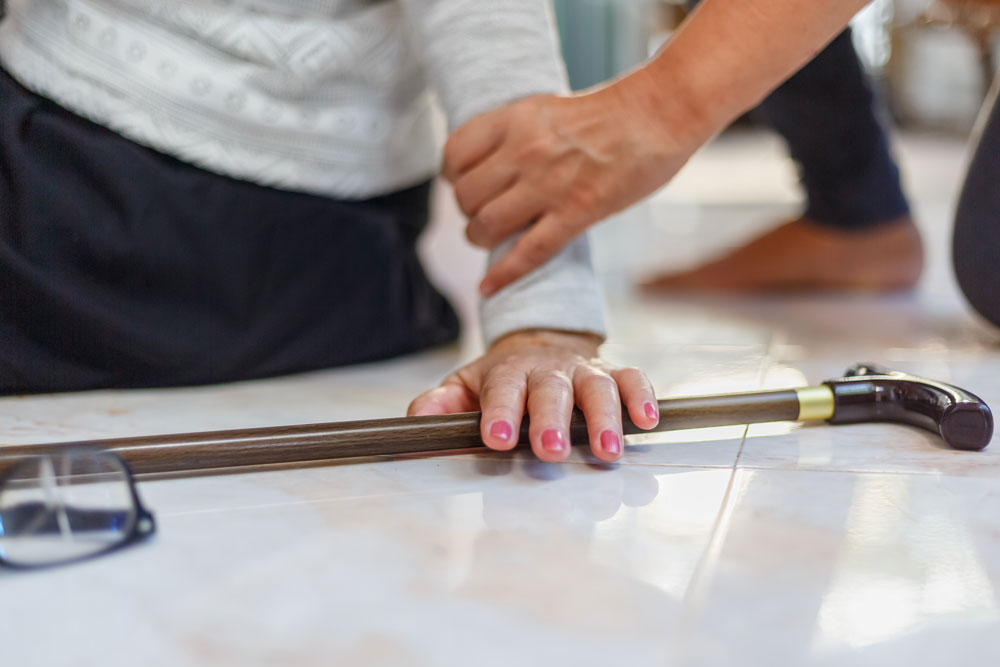While many comedies feature actors and actresses slipping and falling to make audiences laugh, slip & fall and trip & fall cases are serious matters. Injuries such as broken bones, concussions and serious brain injuries can occur from slipping and falling. The elderly are at the most risk as slip & falls and trip & falls for them can result in serious injuries and even death.
If you or a loved one have been injured in a slip & fall or trip & fall case, you likely are facing a number of questions. Below are six of the most frequently asked questions with our explanations for slip & fall and trip & fall cases.
Frequently Asked Questions
What warrants a slip & fall or trip & fall case?
Deciding whether you have grounds for a trip & fall or slip & fall case can be confusing at first. You do not automatically receive compensation for slipping or tripping on someone else’s property. Typically, the deciding factor is whether you can prove there was negligence involved in the incident. If the landowner failed to provide a safe environment, then they are liable for your injuries.
What are landowners or property owners liable for?
If you are a landowner or property owner, you need to understand what you are liable for concerning safety. There are some things out of your control, especially if the timing is not on your side. However, if there are safety concerns you are aware of, you need to take the proper precautions to notify those who enter your property. This could include putting up warning signs for slippery floors or wiring on the floor. All in all, you need to make sure you are properly maintaining your property, especially in the winter months when snow and ice bring more safety concerns.
If you are injured from slipping and falling due to the negligence of the property owner, you need to be able to prove that negligence was, in fact, involved. While property owners need to provide a safe environment, they are not liable for every little thing. Therefore, you need concrete evidence and an experienced attorney on your side to receive compensation for your injuries.
What are common causes of slip & fall and trip & fall cases?
There are a number of causes of slip & fall and trip & fall cases. Here are some of the most common examples:
- Broken sidewalks and pavement
- Poor maintenance of snow and ice
- Foreign substances left on the ground
- Unmarked cables and wiring running across a floor
- Hidden defects in flooring material such as ripped carpet
- Poor lighting
This list does not include everything that could cause you to slip or fall. Each case is different and will bring a variety of challenges, which is why you need a dedicated attorney for your case.
What’s the difference between a slip & fall and trip & fall case?
Don’t worry, this is not a trick question. The difference between a slip & fall and trip & fall case can be conveyed through the titles themselves. However, it is worth noting this difference as these types of cases have a number of variables at play. You need to know whether you fell because you slipped on something or if you fell because you were tripped by something else. This is because in order to receive compensation, you need specific evidence of the property owner’s negligence. If you’re not sure how you were injured, it will be difficult to receive the compensation you deserve.
What kind of compensation can I receive from a slip & fall or trip & fall case?
Unfortunately, even when the negligent party is clearly at fault, you still need to prove there was negligence involved in your case to receive compensation. You also need to explain how the injuries have negatively impacted you, such as pain and inability to work. Then, you can receive monetary compensation for the negative effects you received from the accident. Slip & fall and trip & fall cases can be difficult to navigate on your own. By hiring an experienced personal injury lawyer, you will have the best chance of receiving compensation for your injuries.
What should I do if I am injured from slipping or falling?
Your first priority should be your health and safety. After receiving medical attention, you need to contact an experienced personal injury attorney. In doing so, you will be able to explain your case so your attorney can set up the best defense for the situation. Proving negligence can be challenging, however, with the right attorney on your side, you can receive the compensation you are entitled to.
Connect with Personal Injury Attorney Phil Dahlberg Today
With over 20 years of experience in personal injury law, Phil Dahlberg has the compassion and skill to represent you. He will fight for your rights and will work to understand your case. Connect with Phil here to set up a consultation today.

